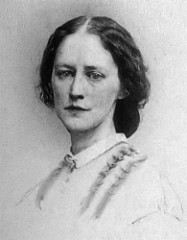Jane Stuart Woolsey to a friend in Europe
May 23, 1862.
We all talk politics now. I asked a wide-awake cousin to-day, ” What do you think about England now?” “England? England?” was the answer, “I had entirely forgotten that there was such a country!” . . . Our English friends sent us Mr. Gladstone’s speech. Mr. Gladstone is a fair representative Englishman, and a man whom everyone must respect, but hear him! the same mysterious incapacity to understand us. Hear his excuse for England’s lack of sympathy. He says an expression of sympathy with us would have alienated six or ten millions who might have become an independent nation! But why alienate, for their sakes, eighteen or nineteen millions, already an independent people? Because the friendship of the rebel section (granted independence), was better for trade. How the shop shines through! Then he uses the false analogy of the rebels of ’76, etc., etc., and that is the best they can do. But at the same time I honor the fortitude, and pity the sorrows of Lancashire, and don’t despair of even “sympathy” when Bright and Stuart Mill live and lift up their voices; though it seems sometimes as if Great Britain had wantonly thrown away the friendship of this country, between the South, which hates her because she has not yet broken the blockade, and the North, which distrusts her intentions. Probably there is no other question on which both sections are so completely agreed… I think I must have done my little duty by the affairs of the nation, and descend from these topics to the comparatively ridiculous items of personal narrative. We are connected with one or two organizations for receiving the disabled volunteers on their way home, . . . helpless, wasted, gaunt, fever-smitten, worn-out men. It is the old story; camp sickness immensely in excess of wounds. A great many have died at the city hospitals, and a great many are still here, slowly going, or slowly recovering. We do what we can. There is nothing they need or fancy, they cannot instantly have, but it is heart-breaking work; I feel as if I had been wrung out and dried: and how nobly the men behave! I must testify to their patience and sweet humor through everything, dying in torment with a smile in their eyes and grateful thanks on their tongues; praying for their country and their nurses in their last delirium. I could tell you twenty stories, but I’ll only tell one. Private Jones, hurt mortally in the charge on the rebel rifle-pits at Lee’s Mills, and forced to have the bad regimental surgeon’s work done over again here, showed great fortitude, the tender-hearted surgeon told us, during the dressing of his wounds. We repeated the surgeon’s praises to him and asked him if he really found it easier than he feared. “O, no!” the dear boy said, “it was very bad, but I saw the tears in the doctor’s eyes, and do you think I was going to let him see how much he hurt me?” My head and heart have been so full of these things that they will come out through the inkstand. The “boys” have a great deal to say about the ” mean whites,” and several of them have told me emphatically that they consider them much less worthy of freedom than the negroes. Sergeant Eaton tells me “their faces are dirty, their clothes are dirty, and their conversation exactly matches their dress.”… Mrs. Howland and Georgy, who are in the transport service on York river, say no praise can do justice to the untiring and tender carefulness of the volunteer doctors. They speak very highly of Mr. Olmsted, who directs it all, finding, as they say, continual comfort in his administrative genius. They explored the forsaken works at Yorktown, and saw the wreck and the indiscriminate, wanton destruction of the flight. They saw many tin plates left with bits of pork upon them, and nasty tin cups with dregs of coffee, but almost every plate and cup they saw, was slashed with an axe. Here and there all through the camps were stakes driven with the warning, “dangerous,” graves of torpedoes and other infernal apparatus. Charley saw one in a water-jug. He is volunteer purser, and he and the ladies go from one transport to another, as they are wanted… The siege-approaches, or whatever they call them, are killing work for the men. I asked a wan, crippled creature at the Park Barracks last week if he had been in battle. “Oh, yes,” he answered, “in many battles, but I fought them all with a shovel.”
